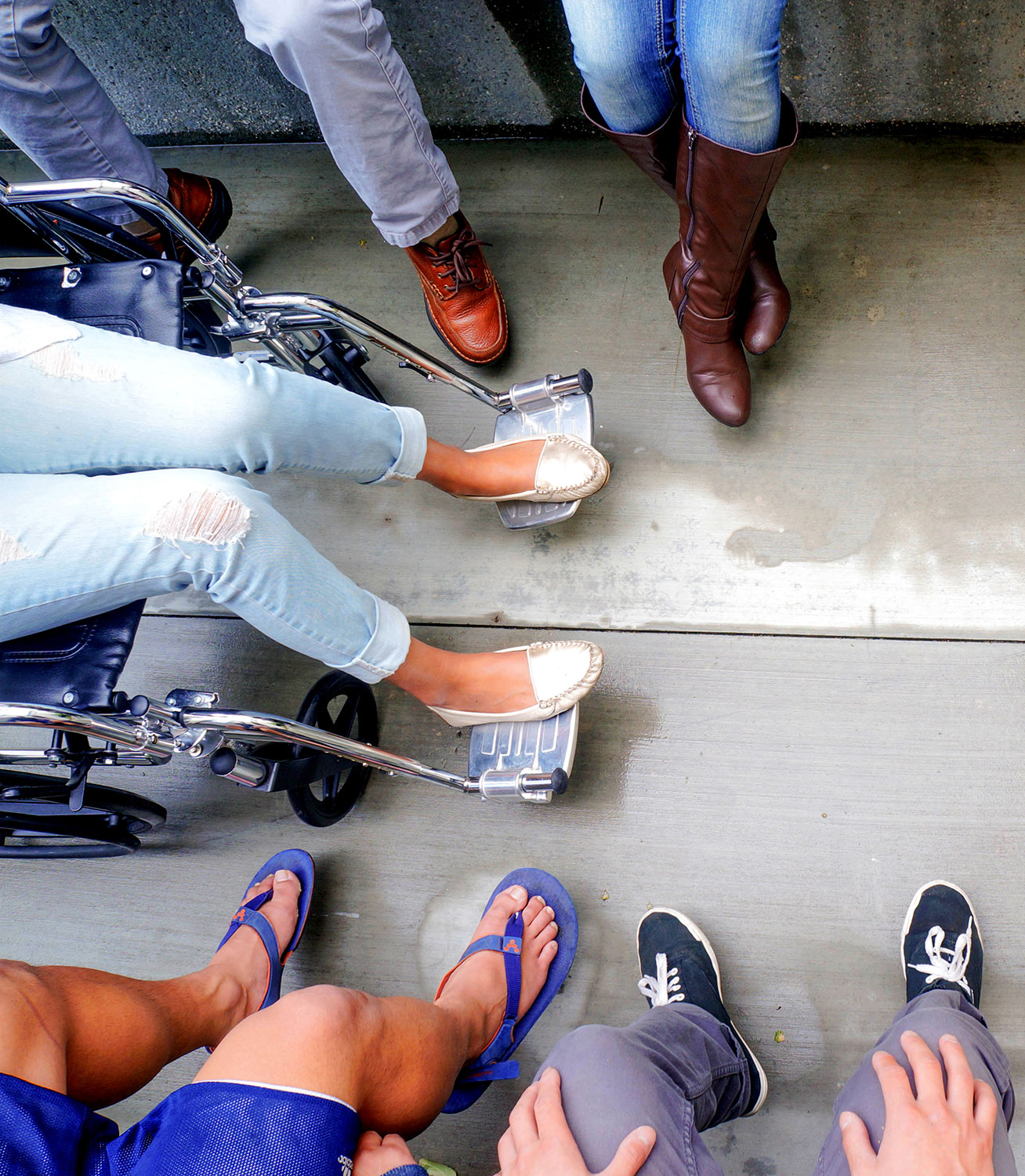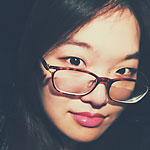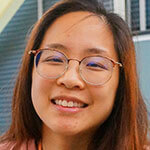
Two newcomers arrive at the same church small group.
One comes in a wheelchair, the other on her own two feet.
Both come with insecurities and assumptions.
Both are welcomed and embraced.
JOANNA: Take a deep breath, Joanna.
Why am I going to this small group? I haven't had the best experiences with Christians. Has Barnes & Noble taught me nothing? I'll just be minding my own business, and someone will come up to me and say, "Do you mind if I pray for you?" "Uh, here? OK ... " And at that moment, they pray for me, not realizing that I'm thinking, "Oh God, I don't want other people to see me in this state right now." I worry that people might think that something's wrong with me, that of course, it's because I'm in a wheelchair. I get it. I understand that it's coming from the goodness of their heart, but after they pray, it's "I hope you have a nice day," and they leave and I never get to know this person. Do I even want to know this person?
It took a while for me to go to church, let alone an "ekklesia". I didn't even know what that was; I think it's a small group of church people. I've never gone to something like this before.
These doughnuts were a bad idea. I thought buying them ahead of time would make me more comfortable — something to say, "Thank you for having me over." Steve was trying to calm the doughnut lady down because we parked in the handicap space without my placard, which I felt really bad about doing. I barely know Steve — he was just the person who picked me up to go to this small group. I'm giving off a bad impression already.

ERI: Showcase the best version of yourself, Eri. When you shake someone's hand, grip it hard and give a firm shake, because that impression will last for a long time. You're on a stage and have the opportunity for the person in front of you to like you, so be nice and friendly, prim and proper. What are you wearing? Is it half-decent? Just be careful.
Smile.
Nod.
Be who they want you to be.
Take a deep breath. It's your first small group meeting. Blend in as much as you can.
JOANNA: On my way to ekklesia, I was plagued by concerns. I knew I was going to a stranger's house, but I didn't know if there would be stairs. The entire drive over, questions rolled through my mind: Would I be able to wear my shoes in the house? Would it be OK if I took my walker inside? Would that — or I — make people feel uncomfortable?
Then there was concern over Bible matters. I was worried that everyone but me knew the Bible from beginning to end, and that I'd seem unprepared. How would they react? How would they react to seeing someone like me? Were they going to pray for me in a group circle?
Oh gosh, there are stairs. What am I going to do?
ERI: I didn't know anyone else, and when I walked in, I saw her. Joanna.
What happened to her? An accident? Her hands looked different. I looked down at mine and sighed out of relief. I didn't feel so much like a sore thumb this time.
The whole night, I couldn't even talk to her and avoided making eye contact. I felt like I had to be careful with what I said. "Regular" people are sensitive enough, so I felt like I had to be extra cautious with her. I thought that she'd also be internally fragile.
It seems like she's already gone through so much, but she's here at this small group, eating the same tacos as I am. I'm not sure what to expect — I've never had a friend with a disability. This is uncomfortable. I can't gauge ... I don't know how to present myself to her.
JOANNA: These two guys in the small group, Tim and Paul, had to lift me because there were these two huge steps to get into the house — I felt really bad. I hated that they were going to figure out my weight! Until that moment, I'd never let anyone carry me except for my dad and that one guy in high school — self-image and all that. Tim and Paul told me not to worry.
I feel uncomfortable and at the same time, grateful. They've assured me that they want me to feel like a part of their family. If this is genuine, I'll open myself up to them. That way, they don't have to figure out how to tactfully ask about my disability.
I know it's not easy to help somebody like me, to push me around or walk with me at my pace when I'm using my walker. I used to hide it really well. Juicy Couture sweatpants helped. In elementary and middle school, I'd wear sweatpants all the time to cover the braces. I never wore shorts or dresses; I even walked with a heavy backpack. I knew my body would get dependent on the walker once I started using it, because I saw my legs getting dependent on my braces. Now I'm in a wheelchair, and I'm still anxious about people judging me, or getting tired of helping me or seeing me again.
ERI: My outer appearance has been the fundamental thing that has shaped me to be someone to others, rather than to be myself. I've always been insecure of my image, so when I saw her, it was like, "Oh, she's already standing out." She can't hide her disability and that seemed like its own disadvantage.
I define strength as being able to handle things on my own. I can put on some plates and deadlift up to 175 pounds, but that also doesn't define strength. I just don't like asking for help. I'm afraid that they'll say no — it sounds like someone is saying no to me as a person. When I see Joanna ask someone to do something, I know how inconvenient that feels. Koreans hate that — we survive on our own.
• • •
JOANNA: I didn't go to church or that small group for three months, because I didn't want to burden anyone to give me rides and stuff; it's not enjoyable. They'd say it was fine, but I thought they were just hiding their true feelings in order to avoid hurting me.
My mom and dad keep reminding me, "Your friends are coming up to see you from Orange County, so it's going to be tiring for them. You should buy them something good to eat. Pay for their gas as a sign of thanks. It's tough wheeling you around and driving you places. Keep in mind that you have to be grateful for everything they do for you. Don't take it for granted." I can't forget that.
I just have to always be gracious toward everyone, even if they have a bad day, lash out at me, or get annoyed. I can't get mad at them, because I'm already so appreciative that they're spending their time with me. It's something I value a lot.
So when Eri texted me asking me if I wanted to have a date with her, I was enthusiastic. I had been looking forward to meeting her — I wanted to know more about her and not have to come up with ideas of who I thought she was.
I hope she didn't wait too long for me. Ugh, she's probably not going to be comfortable folding the wheelchair and putting it in her car, but I have to be humble about this.
ERI: I had a one-on-one with Joanna a few weeks ago. I picked her up at her dad's workplace. I had to accommodate her getting into my car — but I had a neat dress on and was afraid to get it dirty. That wheelchair wasn't as heavy as my worry of dirtying my outer appearance. I had to figure out a way to put the wheelchair in the trunk of my car like a puzzle piece.
At this point, I was beyond annoyed. When I pick someone up, there usually aren't extra steps involved. But for the first time, I had to wait on someone to do a basic routine. It was inconvenient and I didn't want her burden on top of mine.
But then we talked. I heard about what she's gone through. In all honesty, I don't know if I could've dealt with it all the same way.
Seeing how she loved on me taught me how to love her. She loved me without judgment. She didn't ask questions. Instead, she accepted and shouldered my burdens. "Tell me more, tell me more." When I told her my story, she didn't make me second-guess myself but reassured me with her eyes — a little glossy from hearing me out and empathizing with the hurts that I've had. She had eyes that cared. She listened. Really well.
Seeing how she loved on me taught me how to love her.
I realize that when I see anyone else, I get to know them, and as I get to grow to love them, doing things for them doesn't feel like a burden. When I saw Joanna, I saw the responsibility of loving her first before I got to know her and her story, as if she needed to be taken care of before getting to know her.
• • •
JOANNA: When I decided to go to retreat, my main goal was to figure out if I could really belong in this Christian community without preconceived judgments. I thought Christians were just there to only hang out with their Christian friends and not with God. I was jealous of them growing up, having separate plans with their Christian friends. I just thought, what's so great about them? Am I less important of a friend?
But I had never been to a retreat before, and so I was really excited about going.
As it turns out, I love traveling without my mom by my side! Being able to spend the weekend with people I don't know — I just feel very proud of myself for doing that. I'm also proud that I'm able to sleep in a cabin with amazing women and people my age, and truly see how helpful they all are. Plus, the fact that Pastor Michelle prayed for me in a way that I was glad to accept.
I feel like I'm supposed to be here and it's overwhelming me.
ERI: The more I got to know her at retreat, the more Joanna shaped my perspective on beauty. As she shared her dreams and aspirations as an artist, I realized how narrow-minded I was toward her — I didn't have expectations of her because I thought that having that condition was already enough for her.
She's teaching me that true beauty is found by utilizing everything that God has given her, whether her hands are on par with others' or not. For her to defy that and figure out ways to hold that pen for hours and hours to create something beautiful with very exacting work, she had to overcome my assumptions of what she could do, her own physical limitations, and her own self-doubt of what she could do — that's three barriers she's dealing with. To defy all of that ... I am in awe.
Seeing her artwork showed me how to glorify God with what you have in your hands.
She just isn't defined by her disability.
• • •
JOANNA: I rarely think about being a burden anymore, unless I'm with somebody new and they want to take me out in their car — but I don't think of it as much as I did in the beginning. Now, the exchange seems so natural: "Oh, can I get a ride with you?" "Of course, no problem."
Back then, I felt like I wasn't showing enough appreciation toward people. I felt like I needed to do more to compensate, but I couldn't. And somehow, that was OK. I found friends. They don't bother asking about my disability. We just talk about each other's day. We laugh a lot. I'm loved. I can feel it.

Joanna Lee’s mind and body never work in harmony, but she doesn’t let that stop her, let alone show. She enjoys socializing, a good cup of latte, comedy, loves all forms of art, and music that doesn’t require screaming and money-this and money-that. She resides in Los Angeles, pursuing art as a career. You can find more of her work at joannaleeinks.com.

Eunice Ho (she/her/hers) is a proud graduate of the UCSD Ethnic Studies undergraduate program and the UCLA Teacher Education Program Ethnic Studies cohort. She honors both her ancestors who came before her and her loved ones who choose to stand alongside her in pursuit of justice, liberation, and healing. Today, she is a history teacher who uses humanizing Ethnic Studies pedagogy; as a graphic designer, she also visualizes data-driven research around educational inequity. Things that give her life include her many houseplants, reading, rock climbing, and watching thought-provoking TV shows.